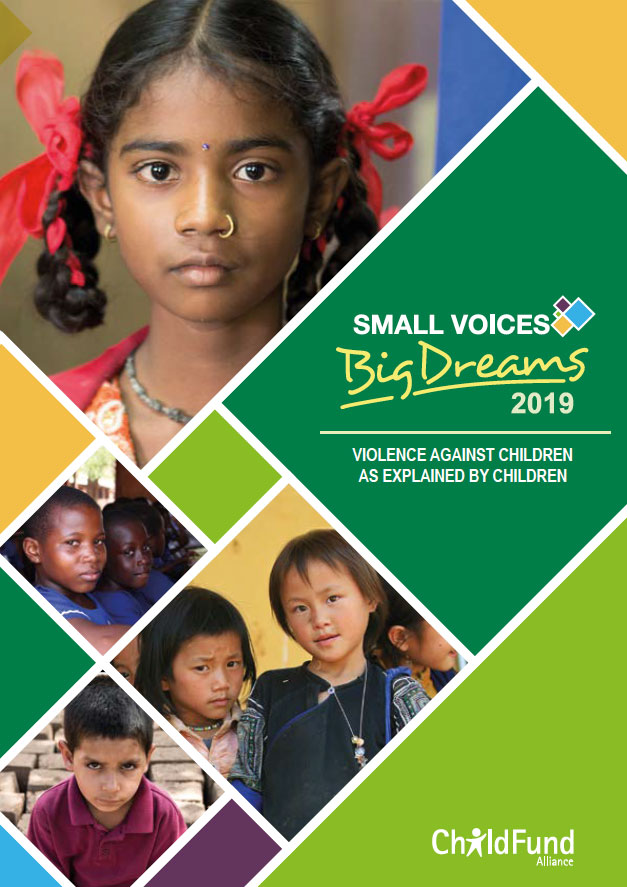New research released by ChildFund today finds that children around the world feel poorly protected from violence, and unheard on issues of importance to them.
The release of Small Voices, Big Dreams 2019: Violence Against Children as Explained by Children coincides with National Child Protection Week (1-7 September) in Australia, which aims to raise awareness about the prevalence of child neglect and abuse.
The global study examined the view of approximately 5,500 children aged 10-12 years from 15 countries, using both qualitative and quantitative research methodologies. Young people from both developing and developed nations were involved.
Of the children surveyed, 40% said that children in their country are not sufficiently protected against violence and the people who wish to harm them.
In addition, one in two child respondents said that adults do not listen to their opinions of issues that matter to them.
ChildFund Australia CEO, Nigel Spence said: “The confronting reality is that over 1 billion children experience violence and exploitation every year.
“No matter where they live, and no matter who they are, no child is immune to violence. Violence against children is a global problem which continues to cut across borders, class, culture, ethnicity, gender and socio-economic status.”
The research found that children globally held similar views on why adults mistreat them:
- because children cannot defend themselves from adults (59%);
- because adults are drunk or on drugs and cannot control themselves (52%);
- because those adults were also mistreated (47%).
When asked what adults could do to prevent violence, those surveyed said:
- adults should listen to what children have to say, and love children more (90%);
- adults should explain to children that they have a right to be safe and protected (89%);
- adults should teach other adults how important it is to keep children safe (88%).
Mr Spence said: “The results reveal that children are well aware of the types of violence occurring in their communities, identifying both physical and emotional abuse, as well as structural forms of exploitation such as child labour and child trafficking.
“Two-thirds of those who took part in the survey said that they did not agree with the idea that children are unable to do anything to stop violence. They believe they can be agents of change in their own communities.”
The results of ChildFund’s global survey have been welcomed by the National Association for Prevention of Child Abuse and Neglect (NAPCAN).
NAPCAN CEO Richard Cooke said: “This research gives children around the world a voice, which is incredibly powerful and provides valuable insights into the way the children experience violence and abuse.
“The rates of abuse and neglect in Australia are shockingly high, with some studies suggesting that as many as 1 in 4 Australian children have experienced some form of abuse or neglect, with domestic and family violence playing a big part.
“Australia has been one of the few developed countries which has not undertaken a national survey of child abuse, so we were pleased to see the first Australian Child Maltreatment Study commence earlier this year.
“Access to comprehensive data is the first step to understanding all dimensions of violence against children, and the first step to eliminating it. Children need us to do better.”
The Small Voices, Big Dreams survey found that children were most likely to feel safe at home or at school, while the internet and social networks were identified as environments of high risk.
Globally, children named mothers as the most protective individuals in their lives. Politicians, and other adult leaders, were seen by two-thirds of children globally as the members of society least likely to protect children.
Mr Cooke said: “If we are to meet the Global Goal of ending violence against children, we must continue to invest more in understanding the problem, addressing the risk factors, and promoting protective factors.
“And it is essential that we listen to children: the more we understand the problem, the better we are able to address it.”
Mr Spence added: “Too often, policy and lawmakers fail to consult children when developing initiatives or regulations aimed at improving their lives. Violence against children is best understood by the children who experience it personally or witness its prevalence in their communities.
“Enabling greater child participation in the issues that affect them, contributes to the empowerment of young people, which is a violence prevention mechanism and of itself.
Australia is one of 140 signatories to the United Nations Convention on the Rights of Child, which marks its 30th anniversary in November.


